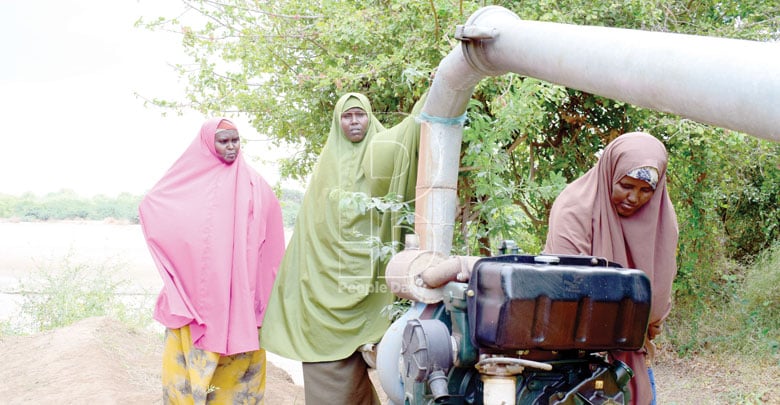How community is turning arid land into productive farms in Fafi
By Milliam Murigi, August 6, 2019At exactly 8am on a Tuesday, our journey from Garissa town to Kamuthe Village, Fafi constituency 40km away commenced.
Outside temperatures hovered around 26 degrees Celsius, but as we progressed to the interior of this vast constituency, it became hotter and uncomfortable. All farms were covered by mathenge plant — known botanically as Prosopis juliflora — an invasive weed, which is causing more harm than good.
Garissa county has been experiencing drought year-in, year-out. The county has immense potential of 894,000 hectares of arable land, but only 2,781 hectares are under cultivation.
As I watched the barren land, I couldn’t imagine how such a desert could be turned into fertile farming land to cultivate and feed the world. But a group of women is turning this into reality. The group has a farm known as Galbet women farm.
Located few metres on one side from river Tana, the 500-acre farm boasts different food crops and fruits such as tomatoes, watermelons, tissue culture bananas, pawpaw, and pumpkins. This green, flourishing miracle is hope that stands out against the stark, arid yellow of the vast advancing desert.
Amina Hassan, 29 and a mother of six is the leader of Galbet Women Group. She displayed some tomatoes, bananas and pumpkins that they have successfully grown.
“It has not been an easy task to get to where we are today. At first, we had to break the cultural barrier, which hinders women from practising agriculture. According to our society norms, women are meant to be housewives,” said Amina.
One drought season in 2015, Amina teamed up with a few other women with an aim to look for a sustainable source of income for their families. Most of their husbands were always on the move looking for pasture for their animals.
For a start, the group was given 350 acres by another group of men farmers but they didn’t know what to do with it. Luckily they were approached by ActionAid, a global justice federation working to achieve social justice, gender equality and poverty eradication.
A few months later, the women were trained on good farming practices. The NGO also supplied them with seeds, a water pump and linked them with county government extension officers.
“We came to Garissa to tackle Female Genital Mutilation (FGM), but along the way, we realised that there were some women who were into it as a business. If we asked them to stop without offering an alternative source of income, they wouldn’t agree.
That is how we ended up supporting farming activities,” said Lawrence Mwachidudu, ActionAid Team Leader for Embu, Garissa, Makueni and Kajiado counties.
A group of 25 women started commercial farming three years ago. For a start, they planted only watermelons. And since the pump couldn’t water the whole farm, they dug water canals.
After the first harvest, the group made enough money to purchase an additional 150 acres and still have some savings. “This motivated us. All were housewives and relied on our husbands for all our needs. The little amount we made as profit we shared equally,” says Amina.
Later, they subdivided the farm into equal portions and contributed cash to help clear the bushes. They also wrote down some rules and regulations to guide them. For instance, the farmers were to plant different crops in different seasons to boost soil fertility and yields.
Today, Galbet Women Group has 40 members. “We have divided the land in such a way that every portion starts near the river. This has ensured that all the farmers access water,” said Amina.
Each farmer sets aside at least three acres for tissue culture bananas because there is a good market for the crop, though prices keep fluctuating. On the rest of the farm, they are guided on crop quality and quantities to plant to avoid flooding the market. Each member contributes Sh500 per month for water pump management and costs.
Changing culture
“This project has helped me pay school fees for my children unlike before when we used to wait for their father to provide,” said Amina. “Moreover, the family is now better off nutrition-wise because they have different food varieties unlike before when they used to rely on milk and meat,” she added.
The best thing is that the community has now changed the perception that only men can venture into farming. “Some members now plant Napier grass for their animals. This helps because their husbands are nomads who keep looking for pasture,” said Amina.
Amina says that the market is there and most of the businesspersons are now coming directly to the farm to buy the produce. The farm has also created employment for several youth. Some even come from as far as western Kenya and they are earning a decent salary.
However, there is no venture without some challenges. Mwachidudu says the biggest challenge that farmers are facing is flooding, which often sweeps away all crops, leaving farmers counting huge loses. Pesticides and herbicides are also not readily available and because of poor infrastructure, the cost of production is high.
Since ActionAid usually works with the community for 10 years before they exit from a project as a way of ensuring that there is a smooth translation they are currently creating linkages with different stakeholders for them.
